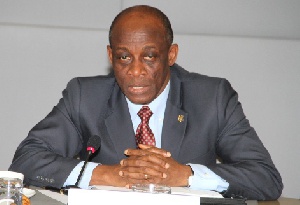Government has drummed home the need to strengthen and deepen the country’s capital market as an alternative source of financing the development agenda, as development funds and donor funding have become limited and costly following the country’s elevation to lower middle-income status.
According to Finance Minister, Seth Terkper, rebasing of the economy which has expanded the country’s per capita income has come with a pricy tag as lenders and donors have re-evaluated their terms.
In a speech read on his behalf at the Ghana Investment Awards in Accra, the Deputy Minister of Finance Mona Quartey said the increase in the country’s GDP has positioned Ghana to capitalise on the goodwill associated with its lower middle-income status and raise funds from the international capital market on reasonable terms.
Ms Quartey however noted the country’s new status as a lower middle-income economy has forced lenders and donors to rethink loan terms and assistance to Ghana.
“Development funds have generally become expensive as donor countries have begun adjusting their lending terms (basically the concessionality of funds no longer apply) to reflect our middle-income status. All the same, some bilateral donors are also beginning to reconsider grant aid to Ghana.
“This new development firmly accentuates the importance and centrality of the capital market to Ghana’s development, and also highlights the need for government to tap into other alternative sources of finance including the capital market to meet its financing needs,” she said.
Ghana's domestic budget has for decades been supported by donors -- which include the World Bank, African Development Bank, the European Union and other foreign governments whose agencies fund a wide range of initiatives from infrastructure projects, technical assistance to state departments and programmes to tackle poverty and diseases.
But as the country became a middle-income economy, which many donors see as a kind of coming-of-age for nations that happened to an extent to Ghana, the biggest factor accounting for donors holding back pledged assistance is the worsened fiscal situation since 2012 -- characterised by hefty deficits and rising debt ratios.
B&FT has gathered that over the past two years donors have withheld direct budgetary support worth more than US$700million in response to the government's large spending overruns and the inability of some ministries to meet conditions for disbursement.
The situation has increased pressure on the government’s domestic revenues, which have to be supplemented by more borrowing to plug the hole created in the budget by suspension of the grants.
According to the Finance Ministry data, government exceeded its borrowing target in 2013, adding GH?1.5billion more debt to its initially projected GH?8billion budget deficit.
Currently, the government is readying to issue its third Eurobond worth US$1billion for 10 years to mainly refinance maturing debts and other interest payments.
Ms Quartey said government’s debt management strategy as approved by parliament, acknowledges our limited access to grants and concessional loans after the nation attained lower middle-income status.
“The debt strategy further recognises the capital market as a key source of financing the development agenda. This has given government further impetus to reform and strengthen Ghana’s capital market to enable it act as a catalyst for socio-economic development in partnership with the private sector.”
She said the country’s capital market must now be an enabler for transformation of the Ghanaian economy by becoming the first point of call for domestic savings and international investors.
“It must be able to finance our nation’s huge development needs as outlined in our Medium-Term Development Policy Framework,” she added.
Business News of Wednesday, 30 July 2014
Source: B&FT













